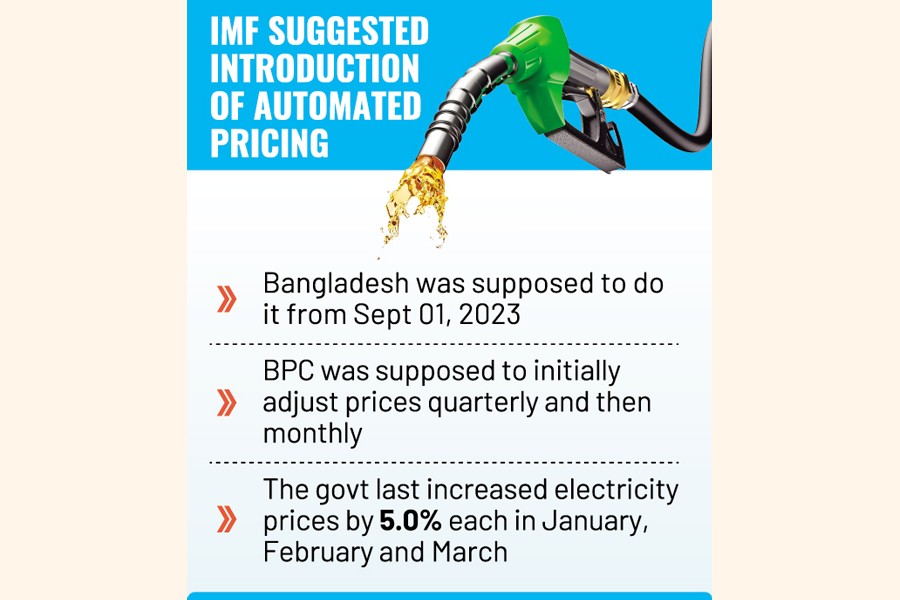Govt shelves dynamic fuel pricing plan for now
Fear of consumer backlash ahead of elections restrains authorities

Published :
Updated :

The government has shelved the plan to implement an automated dynamic fuel-pricing mechanism for now, fearing repercussions from stakeholders including pump owners and commoners, ahead of the next general election, said sources.
The state-run Bangladesh Petroleum Corporation (BPC) has been instructed to slow down the execution of the formula to avoid any sort of unrest over fuel pricing, a senior BPC official told the FE on Saturday.
If the formula - which is meant to keep domestic fuel prices on a par with the international market - is implemented now, the domestic petroleum prices will need to be raised, claimed the official.
However, the domestic fuel prices could have witnessed a decline if the automated fuel- pricing formula had been implemented a couple of months ago when the plan was initiated, he added.
The retail or pump price of diesel and kerosene is now Tk 109 per litre, while petrol is Tk 125 per litre and octane is Tk 130 per litre.
The government was aiming to introduce the automated fuel-pricing formula from the first day of September, following the example of many countries around the world including neighbouring India.
This was in line with a recommendation from the International Monetary Fund (IMF), as the fund called for reducing subsidies while approving a US$4.7 billion loan programme for Bangladesh early this year.
Bangladesh received $476.2 million in the first tranche of the IMF loan in the first week of February, while the second instalment was due to be released in July and the third by December.
Dynamic pricing of fuel is a pricing strategy where the price of fuel changes based on real-time factors, such as the demand and supply, and the price in the international market. This means that the price of fuel can change more frequently.
In contrast to the mechanism, currently, the government determines fuel prices by executive orders, with fuel sold at fixed prices. This system has resulted in profit or loss for the BPC depending on global fuel prices.
Due to concerns about consumer backlash ahead of the next general election, the government previously halted a decision to raise the retail-level electricity tariff by 5.0 per cent every month, after increasing it by 5.0 per cent for three consecutive months - January, February, and March, according to sources.
Under the paused dynamic fuel pricing plan, the BPC was aiming to set domestic fuel prices on a quarterly basis, following the price movements of fuel in the international market.
Later, the price would have been determined on a monthly basis, said a BPC official.
Platts, or S&P Global Commodity Insights, rates were supposed to serve as the benchmark for determining the domestic fuel price, incorporating freight costs, customs duties, company distribution and operational changes and taxes imposed by the National Board of Revenue (NBR), according to sources.
If the dynamic fuel pricing formula could be implemented from September 1, prices of diesel and kerosene would increase slightly, while the prices of petrol and octane would fall significantly.
In India, domestic fuel prices are determined through a daily pricing mechanism based on a 15-day rolling average of the international market price, the exchange rate, tax structure, inland freight and other costs, a system in place since 2017.
Every day at 6:00 am, the prices of domestic fuel, especially petrol and diesel, are revised by the oil marketing companies in India. The fixed rates vary from state to state within India.
In many developed countries, fuel prices are immediately adjusted to reflect fluctuations in the international market.
Prices are set multiple times a day based on international market prices in various countries, including Japan.
From 2014 to 2021, when international oil prices were low, the BPC accumulated profits amounting to around Tk 420 billion, as it did not decrease domestic oil prices during that period.
azizjst@yahoo.com


 For all latest news, follow The Financial Express Google News channel.
For all latest news, follow The Financial Express Google News channel.